Planning and Execution of Fluent OMS Projects
Author:
Fluent Commerce
Changed on:
6 Feb 2024
Overview
Learn how to effectively plan and execute Fluent OMS projects and apply similar steps to your projects. Also, discover our recommended practices, key project milestones and overall guidelines.
Read this document to learn:
- How to run discovery workshops
- How to perform gap analysis and estimation, solution delivery, and launch readiness processes.
- Project roles and responsibilities
Fluent OMS Project Phases
Authors:
Dominik Malzacher, Movyn John, Anita Gu, Cille Schliebitz
Changed on:
31 Jan 2025
Overview
Learn about the typical phases in delivering Fluent OMS projects from Discovery to 'Go Live'.
Key points
- Comprehensive Discovery: Ensure thorough gathering of business requirements and precise backlog generation to set a solid foundation for the project.
- Robust Testing: Conduct System Integration Testing (SIT), Performance Testing, and User Acceptance Testing (UAT) to validate all aspects of the solution.
- Client Involvement: Engage clients early, especially before UAT, to familiarize them with the user interfaces and gather their feedback.
- Successful Launch: Execute a meticulous production deployment, including data staging and validation testing, to ensure a smooth 'go live' transition.
Typical Project Lifecycle
At a high level, a typical project lifecycle consists of discovery and solution design, implementation, testing and launch. An example project timeline showing the different phases is shown below.

- Discovery is the initial phase of the project. This phase involves gathering business requirements, generating the backlog, and updating project estimates and schedules.
- Implementation covers configuration, development and testing phases.
- System Integration Testing (SIT) is used to test individual integrations between systems (i.e. end-to-end). Performance Testing is used to confirm the peak volumes for orders and inventory loads.
- User Acceptance Testing (UAT) is where the business signs off on the end-to-end business scenarios and reporting. Typically, the client is onboarded just before UAT, so they can effectively use the web apps (Fluent OMS and Fluent Store) user interfaces during testing.
- Launch and 'go live' carry out the production deployment, data staging and validation testing phases of the project lifecycle
Related content
Topics for Project Discovery
Authors:
Dominik Malzacher, Movyn John, Anita Gu, Cille Schliebitz
Changed on:
31 Jan 2025
Overview
Discovery is the critical first phase of any project where all parties develop a shared understanding and mutually devise strategies to solve the various problems from an OMS perspective. It gives the opportunity to align the client, project team, business, IT stakeholders, and other vendors but also ensures the project is steered in the right direction with a strong foundation. Discovery topics refer to the main areas we suggest should be covered during a discovery session.
Key points
- Recommended topics to cover in discovery workshops:
- Ecosystem and integrations
- Omnichannel experiences (apps and orchestration configuration)
- Business operations, project and change management.
Discover topics are grouped into three parts in the diagram below. When structuring the workshop, the recommended approach is selecting the topics relevant to the client's requirements.
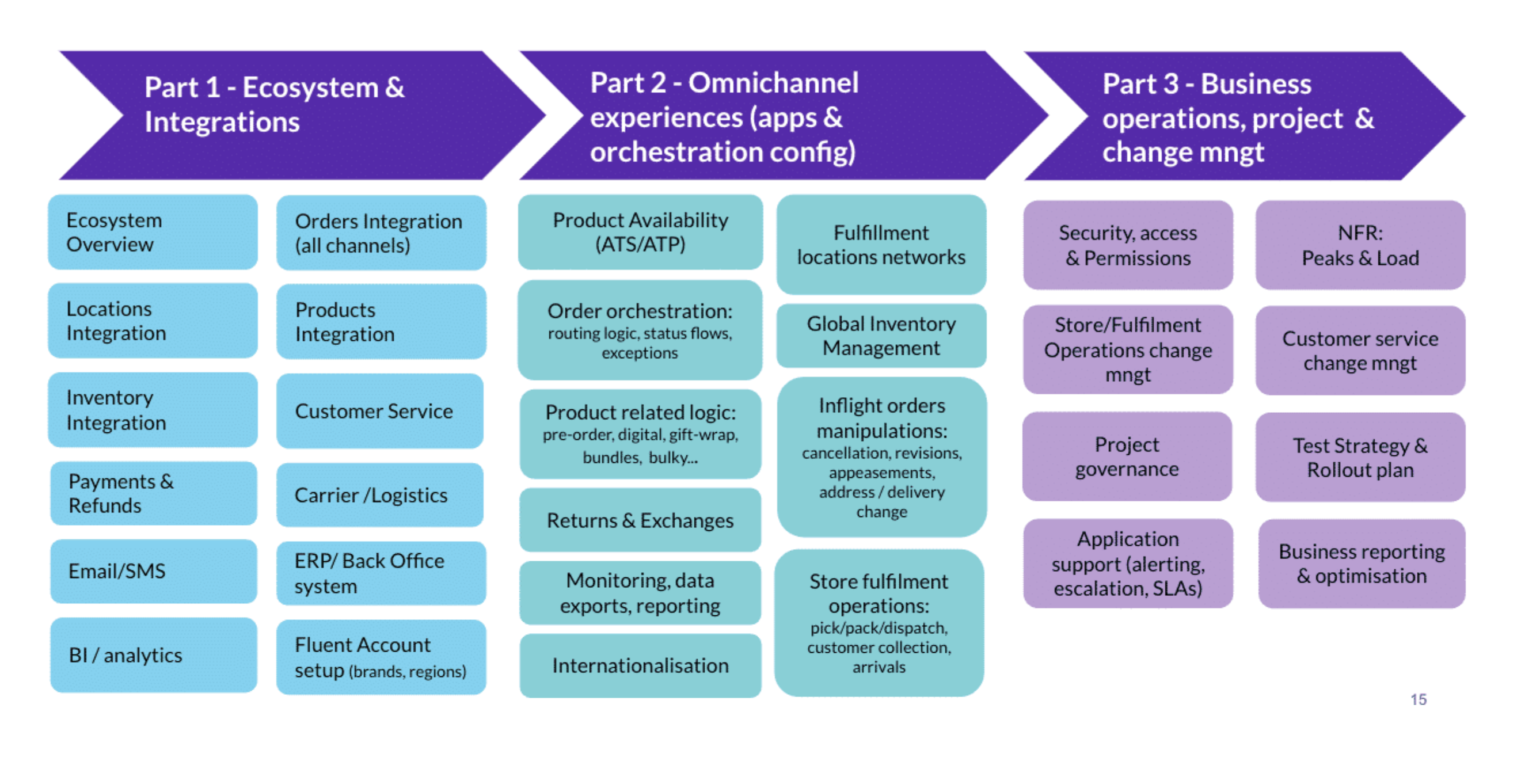
Ecosystem & Integrations
The discovery topics here help to determine information relevant to the current ecosystem and technical integrations. This includes integrations such as:
- What systems will be integrated (e.g. Salesforce, Adobe, SAP)
- How many brands the client owns and in what regions do they operate (e.g. Asia-pacific, Europe, Australia only)
- How many order channels are going to be integrated with the Fluent platform (e.g. Amazon, eBay, e-commerce website, point-of-sales system)
- What systems are going to provide product, inventory and location information to the Fluent platform (e.g. A client may have 20 locations: 15 stores, 2 warehouses, and 3 suppliers).
- Expected volume and frequency of information updates (e.g. 1000 inventory positions per minute)
- Other system integrations needed to communicate with the Fluent platform:
- Customer service systems
- Logistics/carriers systems for orders that require delivery (e.g. Australia Post, Ship It)
- Payment integrations (e.g., Afterpay, Paypal)
- ERP/WMS
- Systems required for reporting
Having a good background understanding of Product, Location and Inventory information determined in Part 1 makes the next part (Omnichannel Experiences) much easier to complete.
Omnichannel Experiences
Omnichannel Experiences help to determine how the Fluent platform can help to achieve client-specific objectives and requirements in the domains of Order orchestration, Inventory management, Product availability, and Store fulfillment.
Business Operations, Project and Change Management
Topics covered in this part help determine who the internal and external stakeholders are (e.g., suppliers) impacted by the change in processes and systems. A change in systems and processes will require staff training to become familiar with the process and system changes.
Includes topics such as:
- Planning for system testing after development and a plan for how this will be rolled out.
- Non-functional issues, such as:
- How many inventory positions are expected to change every day and how frequently;
- How many orders does the client expect on a regular day vs. Black Friday sale.
- Operational support after rollout:
- Monitoring systems, systems to alert or escalate issues when they arise after rollout / SLAs for support.
Expert Service Packages
Authors:
Dominik Malzacher, Movyn John, Anita Gu, Cille Schliebitz
Changed on:
31 Jan 2025
Overview
Fluent Expert Services (ES) are our subject-matter experts who are responsible for ensuring that project implementations leverage the full extent of the software features and capabilities of Fluent OMS, and that best practices are followed. This article will cover the different service packages that are on offer to help facilitate the project, keep it moving forward and involve all parties (Expert Services, Partner, and/or the Client) working collaboratively to validate choices, monitor progress, and review developments.
Key points
- Some of the packages provided by the Expert Services Team:
- Discovery and Solution Design
- Order Management Experience
- Go-live readiness
Discovery and Solution Design
This package is designed to assist with discovery and ensure successful implementation of Fluent Order Management. It's popular with partners and clients who are still learning the ropes and would benefit from having support from an Expert Service Consultant to help guide the process and ensure that implementation commences in the right direction. It includes the provision of technical and functional guidance throughout project delivery according to Fluent Order Management best practices. The team is also there to help conduct detailed technical and functional checks and reviews, and also assist with:
- Integration mapping support and design
- Domain-specific workflow design (Order, Inventory, etc.) such as rulesets, rules, states, and user actions
- Best practices, both technical and functional
- Help with designing rules
- Help with user experience design
Order Management Experience
Designed to assist with:
- Analysis of existing Admin Console and Service Point web app configurations (if still being used), and adoption of the Fluent OMS and Fluent Store web applications
- Best practice guidance in developing on the Fluent UX Framework
- Guidance around customising Fluent Commerce web applications to a client’s business requirements
- Report with findings and actionable recommendations
- Analysis walk-through with Client and/or Partner
Go-Live Readiness
Designed to support the successful go-live of Fluent Order Management. It includes a review covering multiple checkpoints to ensure the solution is certified to launch. This process is intended to be run 2-3 times to ensure the implementation is in a 'fit-for-production' state, and includes a Ready For Launch report (RFL) for partner and client records.
Engagement of Expert Services
When the engagement of Fluent's Expert Services team begins and ends is shown in the project timeline below:
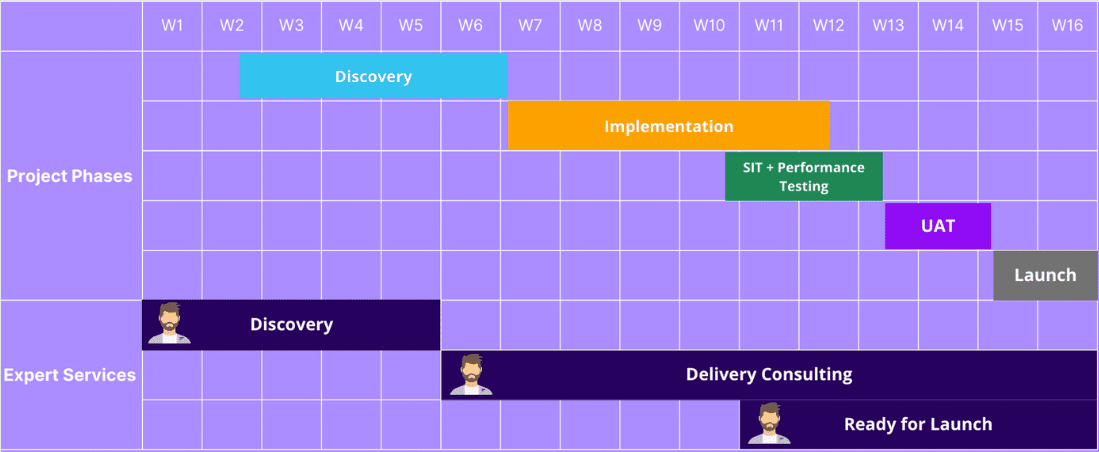
Ready for Launch Activities
Authors:
Dominik Malzacher, Movyn John, Anita Gu, Cille Schliebitz
Changed on:
31 Jan 2025
Overview
The Ready for Launch (RFL) process includes a number of tasks and activities involved in reviewing a client's configuration, inventory management, workflows, custom plugins and integration designs during the project lifecycle.
Key points
- Typical tasks and activities involved in Ready for Launch
- Configuration Analysis
- Inventory Management Analysis
- Workflow Analysis
- Custom Plugin Analysis
- Integration Analysis
Configuration Analysis
Analysis of the general account setup, such as settings and users. It also includes the verification of key platform feature toggles which are required for any new Fluent account.
Inventory Management Analysis
Involves the analysis of inventory management, such as the nature and frequency of inventory batches. Inventory processing in large volumes can result in computer-intensive operations within the Fluent platform, resulting in a potential impact on the overall execution of business logic. Because of this risk another focus area is on the analysis of inventory volumes, which can lead to required optimisations and changes in the way inventory is handled.
Workflow Analysis
Includes analysis of workflows in the account with a focus on the structure, readability, consistency, and maintainability of the workflows.
Custom Plugin Analysis
Includes analysis of the custom plugin and a review of the corresponding code. Similar to the workflow analysis, the focus is on the structure, readability, consistency and maintainability of the plugin.
Integration Analysis
Integration analysis focuses on the integration of the Fluent platform with other systems. It covers the most important aspects when integrating with the platform.
Partner vs. Expert Services Deliverables During Ready for Launch
Ready for Launch occurs 2-3 times throughout the implementation depending on the project complexity. At a minimum, it is done:
- At least once as a mid-point project review.
- At the conclusion of the implementation phase.
By doing this, it gives both partner and client the opportunity for early feedback and the ability to take any remedial action not to delay the project timeline. It further provides the confidence that the solution will be fit-for-purpose.
Partner-led and Fluent Expert Services-led activities:
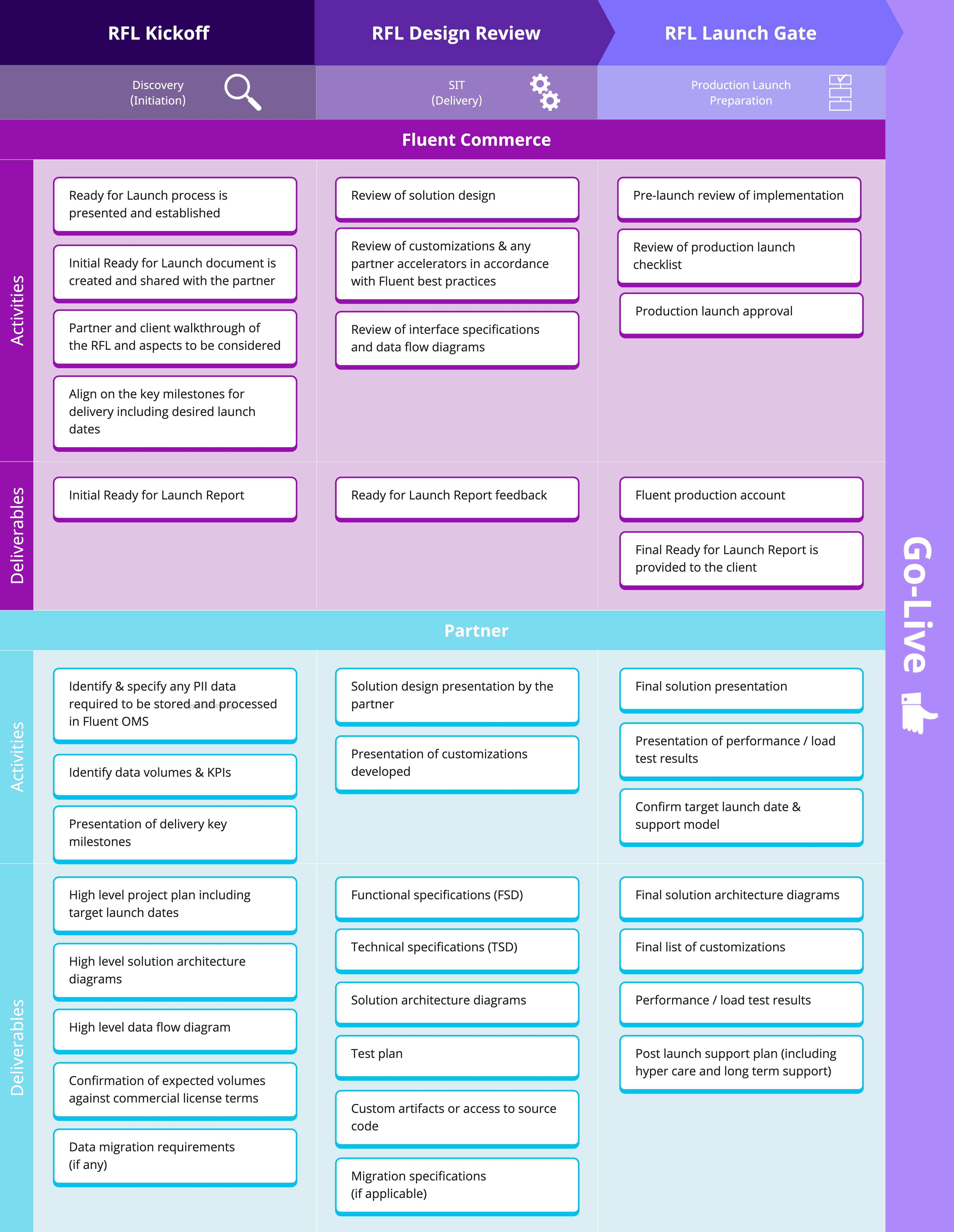
Related content
Project Roles and Responsibilities
Authors:
Dominik Malzacher, Movyn John, Anita Gu, Cille Schliebitz
Changed on:
31 Jan 2025
Overview
This article will cover the typical team setups involved in Fluent OMS projects, and the various roles and associated tasks in delivering a successful project.
Key points
- Project team setups typically include clients, implementation partners and Fluent's Expert Services team.
- Project representatives from Fluent Commerce, the Client and/or the Partner are separated into distinct areas of project responsibility. See below for the typical roles and responsibilities for both discovery phase and project implementation phase.
- Projects are usually partner-led; however client-led in-house projects are also possible.
Projects are led by either the Implementation Partner or the Client directly involved in implementation.
Sponsors and Governance
A Project Sponsor (or Project Manager) on the client side is matched with an Expert Services Senior Manager or with a member of the Client Success team from Fluent Commerce. They will also be matched with the Account Lead and/or the Project Manager on the Implementation Partner's side.
Steering and Design
The Solution Architect, Business Analyst, and Tech Lead on the Partner's side are matched with the Product Owner, Enterprise Architect, and Expert Services Consultant on the client side.
Implementation
During the implementation process, the client's IT team, Fluent Commerce's Expert Services Consultants, and the partner's QA Tester/Engineer and team of Java + React Developers work together.
Workshops and Testing
During Workshops and Testing, Business and IT Stakeholders, Key Users from the client side, Expert Service Consultants from Fluent Commerce, and a Business Analyst from the Partner's end come together.
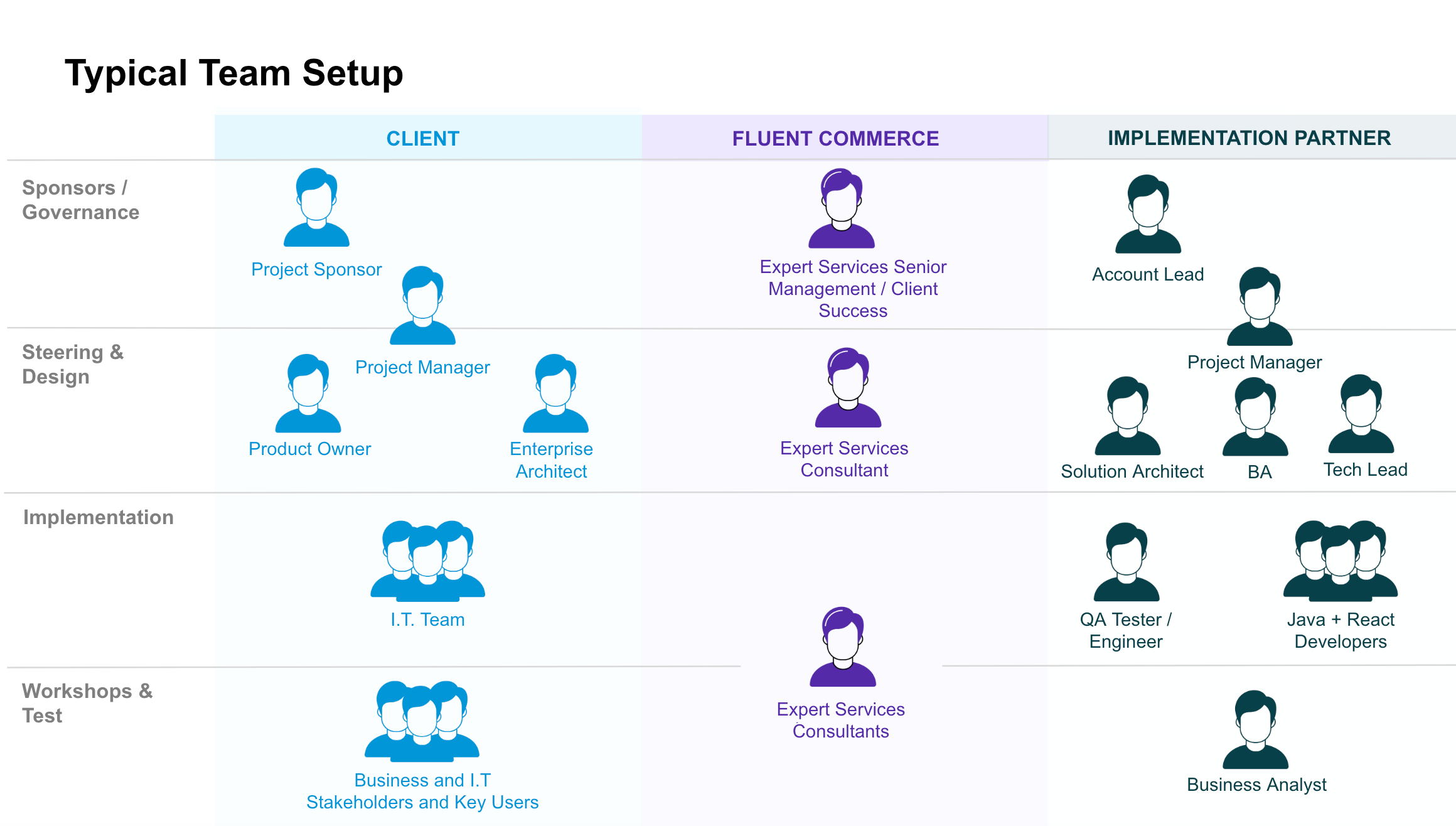
Typical Project Roles & Responsibilities
The following generic RACI chart forms the basis of the overall responsibilities between the client, partner and Fluent during the project implementation phase.
Responsible - owner of the task
Accountable - must sign off/approve the task
Consulted - has necessary information or capability
Informed - should be informed
Discovery Phase
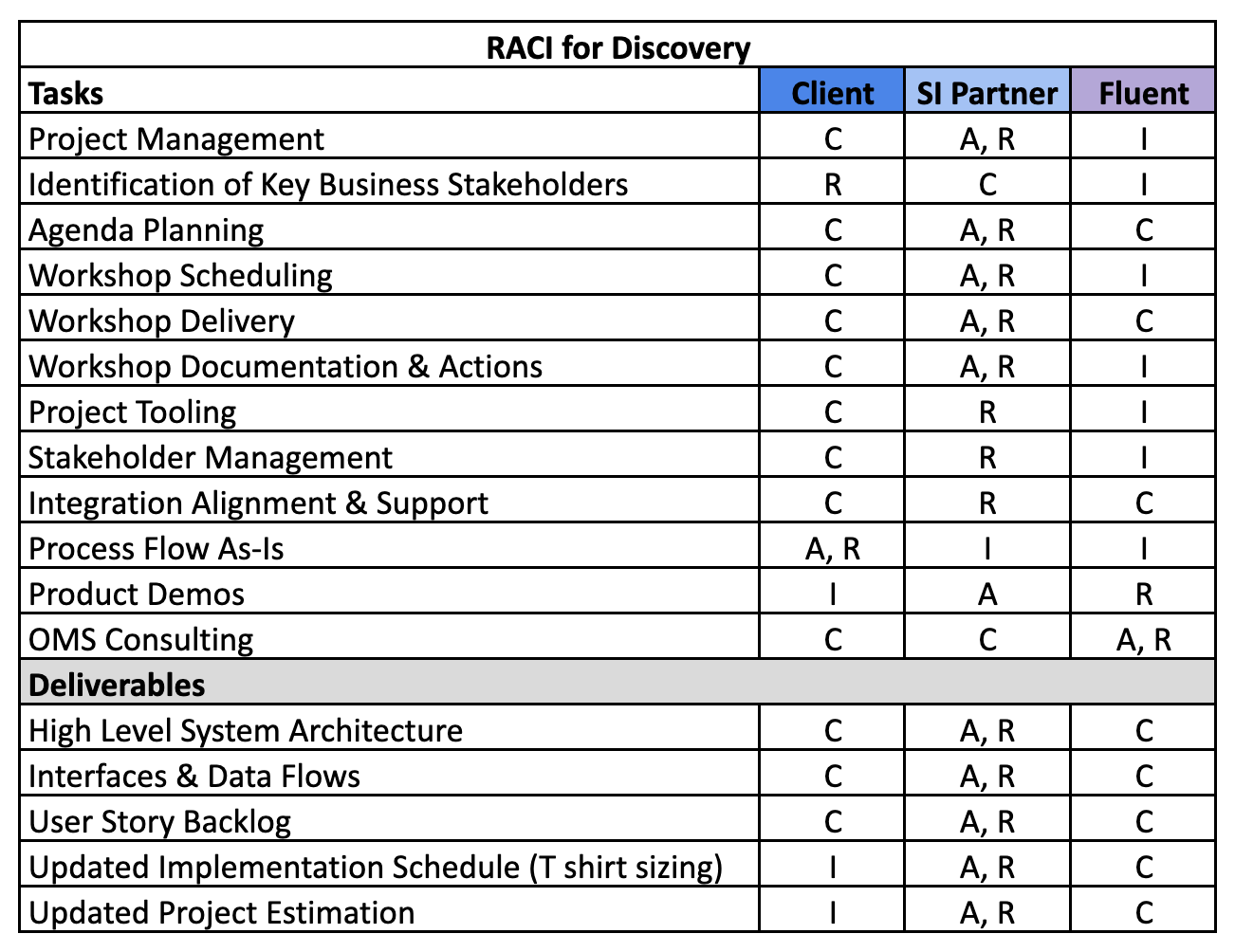
Implementation Phase

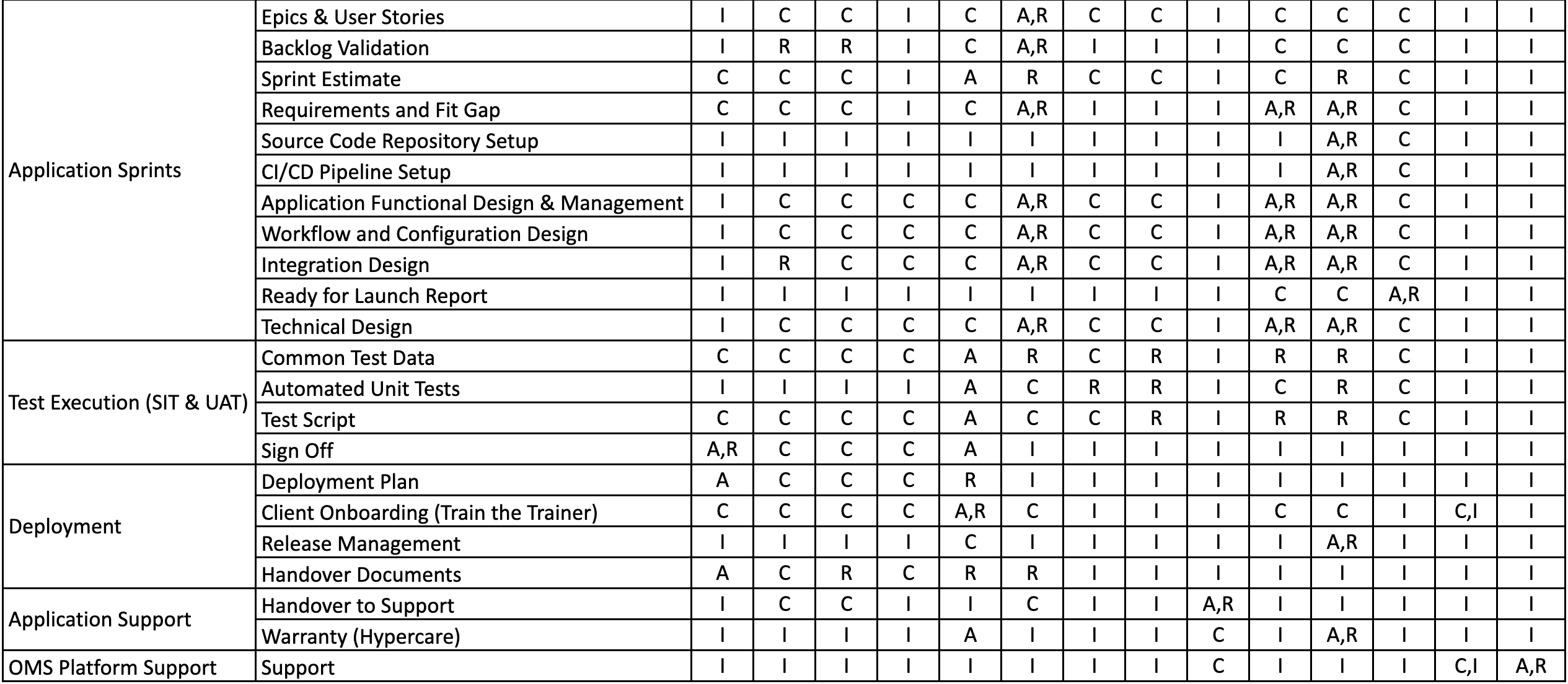
Fluent Commerce Accounts
Authors:
Dominik Malzacher, Movyn John, Anita Gu, Cille Schliebitz
Changed on:
31 Jan 2025
Overview
This article will cover the typical Fluent Commerce account structure, the provisioning of accounts, and some key points covering performance testing.
Key points
- A typical setup of a Fluent ecosystem for a project will include a production and 2 non-production (or sandbox) accounts
- Accounts are provisioning via the Fluent Commerce Expert Services team at the relevant project milestones
- Performance testing should be planned in advance and needs to take place against a dedicated performance test account
Fluent account types
A typical setup of a Fluent ecosystem for a project will include production and non-production (or sandbox) accounts, although this can vary based on a client's individual software license.
Clients and Partners are provisioned with the following standard Fluent accounts:
- 2 x Sandbox for Dev, SIT, UAT
- 1 x Production
Provisioning of Fluent Accounts
Fluent accounts will be provisioned upon request at the relevant project milestones described below. The process to request an account is through your assigned Expert Services consultant. Any accounts issued to clients or partners can only be used for specific project-related phases/activities.
Development & SIT/UAT Sandbox Accounts
Development & SIT/UAT Sandbox accounts are provisioned during the Discovery phase, typically towards the end so it's available for the start of dev work (Sprint 0).
Production Account
Production accounts are typically provisioned within about 6 weeks of Go-Live so that production set-up can commence, once everyone is relatively confident with the implementation on the UAT account, and the Ready For Launch (RFL) report has no blocker issues open.
Project Team Setup
Author:
Fluent Commerce
Changed on:
6 Feb 2024
Overview
Project representatives from Fluent Commerce, the Client, and/or the Partner are separated into distinct areas of project responsibility. This article will cover the typical team setups involved in Fluent OMS projects.
Key points
- Typical team set-up for client-led projects
- Typical team set-up for partner-led projects
Projects are led by either the Implementation Partner or the Client, directly involved in implementation.
Sponsors and Governance
A Project Sponsor (or Project Manager) on the client side is matched with an Expert Services Senior Manager or with a member of the Client Success team from Fluent Commerce. They will also be matched with the Account Lead and/or the Project Manager on the Implementation Partner's side.
Steering and Design
The Solution Architect, Business Analyst, and Tech Lead on the Partner's side are matched with the Product Owner, Enterprise Architect, and Expert Services Consultant on the client side.
Implementation
During the implementation process, the client's IT team, Fluent Commerce's Expert Services Consultants, and the partner's QA Tester/Engineer and team of Java + React Developers work together.
Workshops and Testing
During Workshops and Testing, Business and IT Stakeholders, Key Users from the client side, Expert Service Consultants from Fluent Commerce, and a Business Analyst from the Partner's end come together.
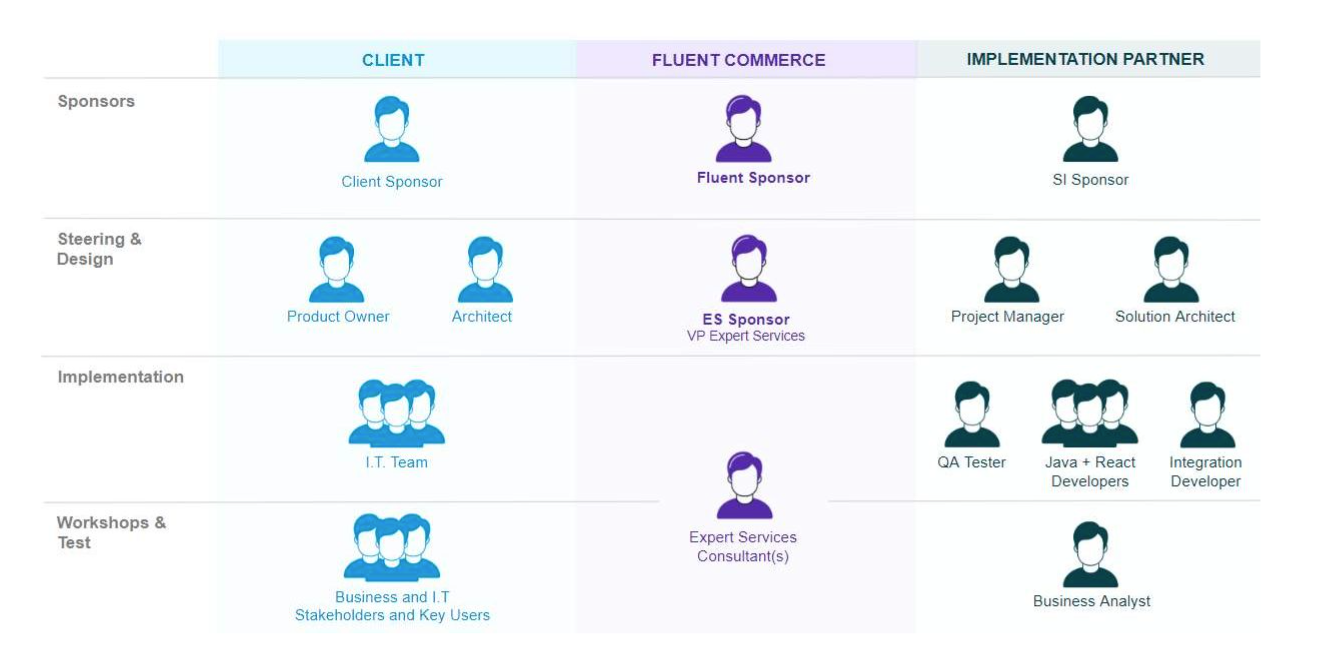
Project Estimation
Authors:
Dominik Malzacher, Movyn John, Anita Gu, Cille Schliebitz
Changed on:
31 Jan 2025
Overview
This article covers the typical approaches used to estimate projects.
Key points
- Project effort estimation
- Requirement prioritisation
Approaching Project Estimation
A typical approach to post-discovery project estimation is shown in the example provided below. This approach can be taken as a good jumping-off point in estimating task sizes and prioritising sprints as the project progresses to development.
Estimation
The first task is to define the effort brackets (also known as t-shirt sizes) to be used for project effort estimation. At an early stage of the project it's useful to use effort ranges in order to convey a level of uncertainty, and depict the expected lowest, average and highest effort scenarios. An example is provided below, however this can be adjusted so it makes sense for your specific project:
- Base = minimal effort (0 to 1 days)
- Small = simple configuration (1 to 2 days)
- Medium = average configuration or simple custom solution (3 - 7 days)
- Large = complex configuration or average custom solution (10 - 20 days)
- X-Large = complex custom solution (20 to 40 days)

Once the estimation brackets are defined, each story or requirement in the backlog can be estimated. The total effort can then be used to identify the project team resource requirements.
Prioritisation
In addition to identifying the T-shirt size effort estimates against each requirement, it is also important to run through requirement prioritisation.
The MOSCOW framework (MUST, SHOULD, COULD and WON'T) is a good way to prioritise requirements as the project moves into development.

Estimation By Priority
Once estimation and prioritisation is complete the overall project estimate can be broken down by requirement priority levels. This can be really useful for defining the project scope vs. budget, and having a conversation with the client around potentially re-categorising the priority or certain requirements if the budget or timeline needs to be optimised.
This can also be translated into Statement of Work (SOW) options as shown in the example below.

Working with Fluent Commerce
Authors:
Dominik Malzacher, Movyn John, Anita Gu, Cille Schliebitz
Changed on:
31 Jan 2025
Overview
This article provides some key guidelines for working with Fluent Commerce on implementation projects, including platform and application support responsibilities.
Key points
- The first point of contact during project implementation phase is your assigned Expert Services consultant
- Fluent Commerce provide platform support along with service desk tooling and support process documentation
- Application support is typically the responsibility of the Implementation Partner, and there must be an application support agreement in place prior to go live.
Fluent Commerce Points Of Contact
The first point of contact for a partner during implementation should always be with their assigned Expert Services consultant. This is for advice, troubleshooting and support during development and testing. There will also be an assigned Fluent Commerce Client Success Manager that will be a point of contact for any commercial discussions or project delivery escalations.
Platform Support
As a SaaS platform, Fluent maintains the availability of the infrastructure the platform is hosted on. The support and availability of the platform (both Sandbox and Production) is maintained by Fluent’s Site Reliability Engineering (SRE) team. As the implementation gets close to launch, apart from the provision of the Production account, there will also be a JIRA Service Desk profile created for the client and partner organisations.
Production Service Level Agreements and the steps to create a Service Desk ticket are documented here: https://docs.fluentcommerce.com/essential-knowledge/platform-support-process
Application Support
The implementing partner is typically responsible for providing application support from project go live, for support of any workflows and associated customisations that have been implemented on the Fluent Commerce platform. It is mandatory for the client and partner to have in place an Application Support Agreement prior to project launch.
